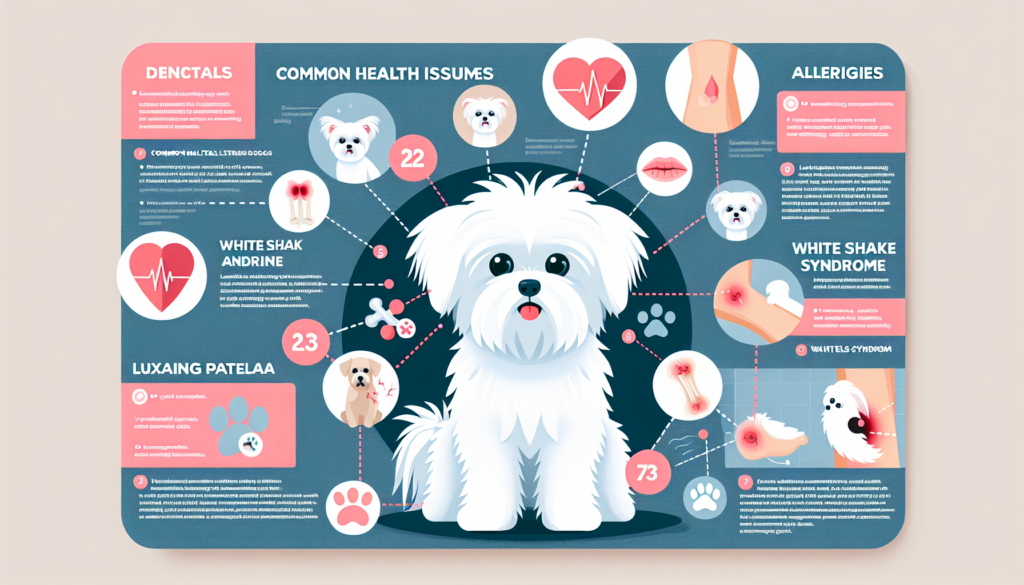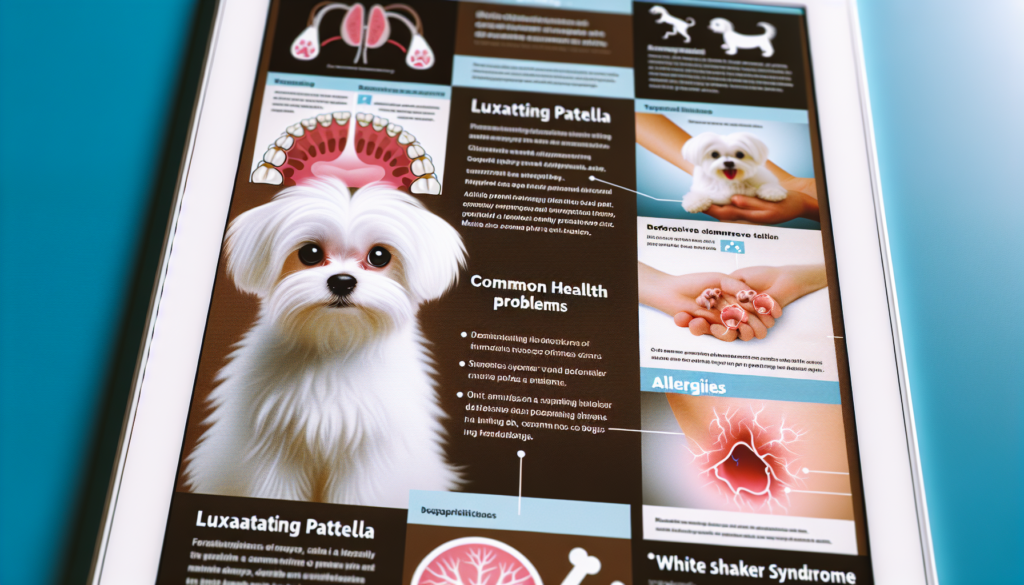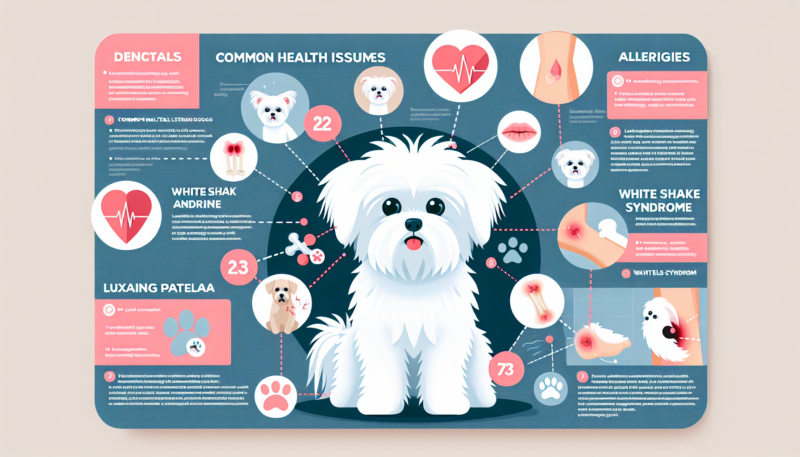If you’re a proud owner of a Maltese dog or considering adopting one, it’s important to be aware of the common health issues that may affect these adorable furry companions. From dental problems to allergies and luxating patellas, this article will shed light on the various health concerns that can arise in Maltese dogs. By understanding these issues, you can ensure that your furry friend receives proper care and attention, keeping them happy and healthy for years to come.
Health Issues in Maltese Dogs
Maltese dogs are small, elegant, and affectionate companions known for their long, silky white coats and friendly disposition. However, like any other breed, they are prone to certain health issues that owners should be aware of. Understanding these common health issues can help you provide the best care and ensure your Maltese lives a long and healthy life. In this comprehensive article, we will explore the various health issues that can affect Maltese dogs and discuss how to manage and prevent them.
Genetic Disorders
Genetic disorders are health conditions that are inherited through generations. Unfortunately, Maltese dogs are susceptible to several genetic disorders due to the breed’s small size and breeding practices. One common genetic disorder in Maltese is patellar luxation, which occurs when the kneecap slips out of place. This can cause pain, lameness, and difficulty walking. Another genetic disorder is portosystemic shunt, a condition where blood vessels bypass the liver, leading to poor liver function. Regular check-ups with a veterinarian and genetic testing before breeding can help identify potential genetic disorders in Maltese dogs and prevent them from being passed on to future generations.
Eye Problems
Maltese dogs are prone to various eye problems, including cataracts, progressive retinal atrophy (PRA), and glaucoma. Cataracts are a clouding of the lens, which can cause vision impairment or even blindness if left untreated. PRA is a degenerative disease that leads to progressive vision loss, starting with night blindness and eventually resulting in complete blindness. Glaucoma is a condition that causes increased pressure in the eye, which can be painful and lead to permanent vision loss. Regular eye examinations by a veterinary ophthalmologist can help detect these issues early on, allowing for prompt treatment and management.

Dental Issues
Maintaining good dental hygiene is vital for Maltese dogs. Their small mouths and crowded teeth make them more prone to dental issues such as periodontal disease, tooth decay, and gum infections. If left untreated, dental problems can lead to pain, difficulty eating, and even systemic infections affecting other organs. Regular teeth brushing, providing dental chews, and scheduling professional cleanings with a veterinarian will help keep your Maltese’s teeth and gums healthy. Additionally, incorporating a balanced diet and avoiding hard, chewy treats can reduce the risk of dental issues.
Allergies
Maltese dogs are prone to allergies, including food allergies, contact allergies, and inhalant allergies. Food allergies can manifest as skin irritations, digestive issues, and recurrent ear infections. Contact allergies occur when the skin comes into contact with certain substances, such as certain fabrics or cleaning products, causing itching and skin inflammation. Inhalant allergies, or respiratory allergies, are triggered by environmental factors such as pollen, dust mites, or mold spores. If your Maltese exhibits signs of allergies, such as excessive itching, redness, or sneezing, consult with a veterinarian to determine the best management plan, which may involve dietary changes, medicated shampoos, or antihistamines.

Respiratory Problems
Due to their small size and short muzzles, Maltese dogs are susceptible to respiratory problems. Brachycephalic airway syndrome is a condition commonly seen in flat-faced breeds like the Maltese, where the structures of the upper airway obstruct normal airflow. This can result in noisy breathing, snoring, coughing, and difficulty breathing, especially during physical exertion or in hot weather. Owners should be cautious about subjecting their Maltese to excessive heat and exercise and provide a well-ventilated environment. Regular veterinary check-ups can help monitor respiratory health and provide necessary interventions if needed.
Cardiovascular Conditions
Maltese dogs may develop cardiovascular conditions such as heart murmurs, mitral valve disease, and congestive heart failure. Heart murmurs are abnormal sounds caused by turbulent blood flow within the heart, and they can range from benign to more serious. Mitral valve disease is a degenerative condition where the valve between the left atrium and ventricle becomes leaky over time. This can lead to congestive heart failure, a condition where the heart fails to pump an adequate amount of blood, resulting in fluid build-up in the lungs and body. Regular cardiac evaluations by a veterinarian, including listening for heart murmurs and echocardiograms, can help detect and manage these conditions early on.
Joint and Bone Disorders
Maltese dogs may be prone to joint and bone disorders, including patellar luxation, Legg-Calve-Perthes disease, and intervertebral disc disease (IVDD). Patellar luxation, as mentioned earlier, occurs when the kneecap dislocates. Legg-Calve-Perthes disease is a condition where the hip joint deteriorates, leading to pain and limping. IVDD is a degenerative condition that affects the spinal discs, potentially causing weakness or paralysis in the hind limbs. Regular exercise, maintaining a healthy weight, and providing a balanced diet rich in joint-supporting nutrients can help reduce the risk of these disorders. If your Maltese displays any signs of limping or difficulty moving, consult with a veterinarian for a proper diagnosis and treatment plan.
Skin Conditions
Maltese dogs are known for their beautiful white coats, but they are also prone to various skin conditions. These may include allergies, bacterial or fungal infections, dry skin, and sebaceous adenitis. Allergies, as discussed earlier, can cause itching, redness, and skin irritations. Bacterial or fungal infections can occur due to underlying allergies or inadequate grooming. Dry skin can lead to flakiness and itchiness, while sebaceous adenitis is an immune-mediated condition that affects the oil-producing glands in the skin, leading to hair loss and skin inflammation. Regular baths with a gentle shampoo, proper grooming, and a balanced diet can help maintain a healthy coat and skin. If your Maltese displays signs of skin problems, consult with a veterinarian for a tailored treatment regimen.
Digestive Disorders
Maltese dogs can suffer from various digestive disorders, including gastroenteritis, pancreatitis, and inflammatory bowel disease (IBD). Gastroenteritis is inflammation of the stomach and intestines, typically causing vomiting and diarrhea. Pancreatitis is inflammation of the pancreas, leading to abdominal pain, vomiting, and loss of appetite. IBD is a chronic condition where the digestive tract becomes inflamed, causing persistent diarrhea, weight loss, and sometimes vomiting. Feeding a high-quality, easily digestible diet and avoiding table scraps or foods that may trigger digestive upset can help prevent these disorders. If your Maltese experiences recurrent gastrointestinal issues, consult with a veterinarian for proper diagnostics and dietary management.
Obesity
Maltese dogs have a tendency to gain weight easily, which can lead to obesity, a condition associated with several health problems. Obesity can put extra strain on your Maltese’s joints, leading to joint and mobility issues. It can also increase the risk of other health conditions, such as diabetes, heart disease, and respiratory problems. Keeping your Maltese at a healthy weight is essential for their overall wellbeing. Provide a balanced diet, avoid overfeeding or excessive treats, and ensure regular exercise to help manage their weight. If you are concerned about your Maltese’s weight, consult with a veterinarian for guidance on proper nutrition and weight management strategies.
In conclusion, Maltese dogs are generally healthy and resilient, but they can be prone to certain health issues. By understanding these common health problems and taking proactive measures, such as regular veterinary check-ups, proper grooming, a balanced diet, and maintaining a healthy lifestyle, you can ensure your Maltese remains happy and healthy for many years to come. Remember, providing love, care, and attention is just as crucial as addressing any health concerns that may arise. Your Maltese’s health and wellbeing are in your hands, so be an informed and proactive pet owner.
